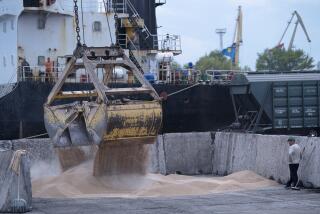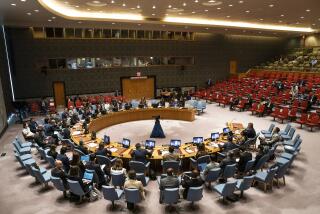Europe Sees Soviet Woes as New Threat : Politics: Summit leaders say Moscow’s food shortage this winter is the immediate concern.
- Share via
PARIS — Even as the leaders of Europe pronounced the Cold War over and the dangers posed by four decades of East-West rivalry ended with the signing of the new Charter of Paris on Wednesday, they saw a new threat rising--that of instability in the Soviet Union.
The leaders, concluding a three-day summit on European security and cooperation, recognized that one of the gravest threats to the Continent now comes from the possibility of further, uncontrolled upheavals as the Soviet economy and perhaps the Soviet state itself disintegrate.
Nor could they fail to notice that the principles of individual liberty and respect for the rule of law that form the heart of the Paris charter, and that Soviet President Mikhail S. Gorbachev has been universally hailed for embracing, may contribute to the danger.
The immediate concern is a severe food shortage in the Soviet Union this winter that might be followed by civil unrest, diplomats said. Such developments could send shock waves through Eastern Europe and possibly trigger a political backlash at home against Gorbachev’s reforms.
This, in turn, would undermine the “new political order” blessed by the Conference on Security and Cooperation in Europe in its visionary Charter of Paris and thrust the Continent into a new era of tensions.
President Francois Mitterrand of France, while celebrating the opening of Europe’s new era, warned at a press conference on Wednesday that “bloody rivalries must not follow in a sort of two-speed Europe in which there would be rich countries that would satisfy themselves in their prosperity and other countries would trail behind and suffer in their poverty.”
Referring to the anticipated surge of millions of migrants from the Soviet Union and Eastern Europe in search of better living conditions in the West, Mitterrand said this “demands precautions and sound measures” because of the West’s own economic problems. “We will be watchful, but one also must not be too pessimistic,” he said.
Once a worst-case scenario, the political and economic collapse of the Soviet Union was accepted here as such a serious possibility that Western leaders focused considerable attention on how their countries might help.
“There is political fragmentation going on in the Soviet Union now whose bounds we simply don’t know,” Raymond Seitz, the U.S. assistant secretary of state for European affairs, said before the all-European summit. “Some of it is very threatening and ominous.”
Soviet officials, too, are worried that instability in their country will, as a Gorbachev foreign policy adviser put it, have “shuddering echoes throughout Europe.”
“Our country is a great European power, and that is its destiny,” Vadim V. Zagladin, one of the Soviet president’s assistants, commented this week. “If we are beset with difficulties--and not just difficulties, but problems of such a dimension that threaten our whole future--all our reforms, even our existence as a state, the ramifications will inevitably be felt across the whole Continent and beyond. . . . “
As they praised Gorbachev for the courage with which he broke through old ideological barriers, first at home and then abroad, Western leaders implicitly raised the question of whether he will be able to manage his country’s further political and economic transformation.
“We are betting heavily on Gorbachev, and everything he has done up to now is prelude to what he must do in the next six months to a year,” a Western European delegate said, asking not to be quoted by name. “Just as it is true that we are here largely as a result of Gorbachev’s courageous, even heroic moves in the past two years, we could also be in the midst of a tremendous crisis if he fails.”
In Washington, a senior Bush Administration official commented, “It’s no secret the Soviet Union is going through a very difficult time. . . . The multiple crises in political authority and economic collapse . . . makes it look like a very difficult winter . . . but there is no sense of panic here. . . . The problems are large, but there are still structures capable of dealing with them.”
The predictions of sudden collapse are “more dramatic than (the need for) long-term economic rebuilding, so it attracts attention,” the official commented. “It is everybody’s worst nightmare, so I understand why everyone worries about it. . . . It is a little bit like nuclear war: You don’t really think it is going to happen, but you have to plan for it.”
The Soviet Union, in fact, is in the midst of a triple crisis: Its economy is disintegrating, nationalist groups are threatening secession and the political structure is collapsing under the impact. Doomsday scenarios are even more prevalent in Moscow than they were in past years, when Western Kremlinologists vied in predicting collapse.
The urgency of the Soviet Union’s problems were underscored Wednesday as Gorbachev discussed further economic help, including substantial food shipments, with Western leaders here.
Although Gorbachev in his recent trips to France, Germany, Italy and Spain was promised more than $15 billion in loans and credits, he sought more assistance as he spoke with other summit participants here on ways to ease the severe food and fuel shortages possible this winter.
Chancellor Helmut Kohl of Germany said on Wednesday that he was ready to transfer the large stocks of food--grain, meat, milk powder and baby food--and other supplies stored in West Berlin in case of another Cold War crisis and to provide more credits for further purchases of European Community surpluses.
Prime Minister Brian Mulroney of Canada said after meeting with Gorbachev on Wednesday that his country would supply food under existing credits of $733 million. The list of urgent Soviet needs includes pork, beef, flour, butter, powdered milk and peanut oil, Mulroney said.
“These are pretty difficult and practical problems to which he must have an answer before the winter sets in,” Mulroney said, describing the danger of serious food shortages across the Soviet Union that Gorbachev outlined. “They made it very clear they were not looking for alms or handouts, they were looking for a commercial transaction, but obviously one on terms as favorable as possible.”
And Gianni De Michelis, the Italian foreign minister, said that the European Community would probably approve a proposal for $1 billion in assistance at its summit meeting next month in Rome.
“The main issue is getting the help there fast,” Kohl told a press conference. “Things have to get there, and then be distributed properly. . . . Otherwise, they face a very perilous time.”
Even President Bush, who has strongly opposed Western assistance to the Soviet Union until its economic system has been fully transformed, said earlier this week that the United States would consider Soviet requests for food aid this winter.
“You want to help new friends when they are in jeopardy,” Bush said. “I worry about the Soviet people during the bleak winter coming up if it proves as severe as some of the reports indicate.”
The United States sees the bigger problem as long-term economic reconstruction of the country, according to Bush Administration officials, and it wants to try to focus on that rather than on short-term crisis management.
“There still is a political process in the country,” a senior official said in Washington. “It is not very healthy, and it has to be put on artificial life support every now and then, as Gorbachev did recently. But it is still there and functioning.”
Times staff writer David Lauter contributed to this story.
More to Read
Sign up for Essential California
The most important California stories and recommendations in your inbox every morning.
You may occasionally receive promotional content from the Los Angeles Times.










